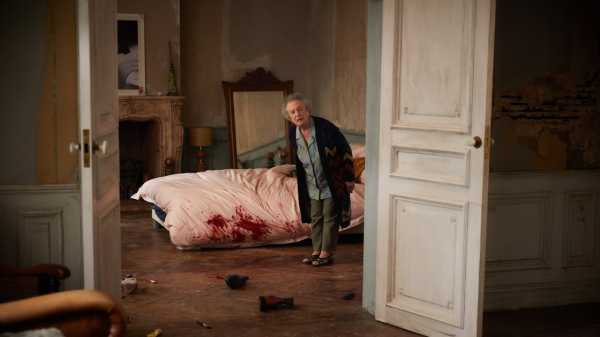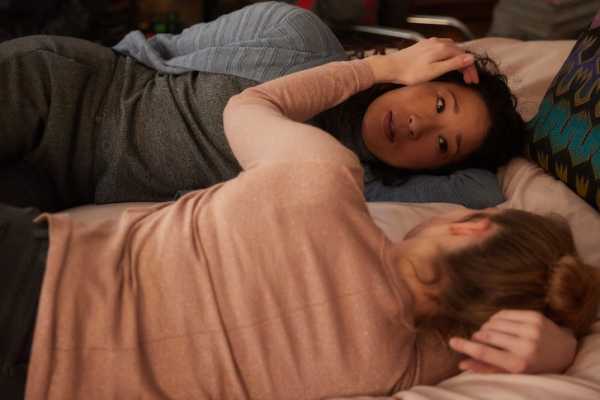
In poetry, the villanelle is a contained, repetitive structure—a rhyme-sandwich (aba) format, first popularized in the nineteenth century, best known from Dylan Thomas’s “Do not go gentle into that good night” and Elizabeth Bishop’s “One Art.” On “Killing Eve,” BBC America’s breakout show, the first season of which ended on Sunday night, it’s the alias of an assassin (Jodie Comer) who’s working for a mysterious organization called the Twelve. The Eve of the title (Sandra Oh) is an M.I.6 agent tasked with tracking Villanelle down. “Killing Eve” corresponds, in a rough way, to the villanelle’s basic framework: the show is about the iteration of a recognizable pattern, its pleasures emerging in the internal twists.
Critical discussion of the show has dwelled, in part, on the idea that “Killing Eve” is a mostly standard-issue spy thriller, with women substituted for the usual men in every meaningful part. The show’s men are formulaic, but the women are deeply strange, forming a collective study in improbable contrasts, strung together by each actor’s charisma. (A brief moment to mourn the murdered Bill, played by David Haigh—a gentle, pansexual bureaucrat, and the show’s only interesting man.) Carolyn, the M.I.6 chief played by Fiona Shaw, is a brusque workaholic and a messy, vain flirt. Anna, Villanelle’s first love and former teacher, played by Susan Lynch, is a bookish woman mourning her husband, whom Villanelle castrated and murdered; she’s also a self-righteous liar who hoards letters from the student she used to take home and have sex with on a chair. Villanelle is a psychopath who demands love and gets it. Eve is a woman going through a bizarre, uncontrollable awakening and a competent professional executing a difficult job.
Some viewers have wondered whether “Killing Eve” is doing enough to draw conclusions about this gender flip—about what it means to reshape a masculine narrative format around women. But “Killing Eve” isn’t shaped around the concept of women; it’s shaped around these women, who are unlike any others in their wild, unlikely interior weirdness and flux. Going into the finale, it seemed equally possible that Eve and Villanelle could team up, or try to kill each other, or fall into bed. Within the last five minutes of the episode, they seem to do all three. But the first season of “Killing Eve” ends in irresolution—an unsettling, tantalizing sense of almost that’s typical of the show.

Photograph Courtesy BBC America / Sid Gentle Films Ltd.
When the finale begins, Villanelle has just broken out of prison and attempted to kill her handler, and father figure, Konstantin, who is, strangely, the latest target given to her by the Twelve. (Konstantin escaped by smashing her across the face with a log.) She has kidnapped Konstantin’s daughter, Irina, a tomboyish, freckled polyglot who opens the episode by screeching that she’s hungry. Irina is unfazed and unimpressed by her kidnapper: she makes fun of Villanelle, psychoanalyzes her, stands up to her. For all of Villanelle’s frightening, exaggerated competence, she’s essentially a child, petulant and silly and rude; kids push her buttons and see her clearly, in a way that adults can’t. (In the show’s first scene, Villanelle knocks an ice-cream dish onto a girl who looked at her askance.) In Irina’s presence, Villanelle regresses, her glamour and momentum stripped away by her unexpectedly long return to the Russian prison—the place where, as a teen-ager, she was recruited by the Twelve. Villanelle is a different sort of likable around Irina: not an amused, flirtatious killer but a fast-food-chomping babysitter—flustered, hair messy, face bruised.
But Villanelle’s theatrical instincts flare back to life when she, Irina, Konstantin, and Eve meet in a gilded tearoom to negotiate Konstantin’s death in front of a crowd. Everyone has something another person wants: Eve has Villanelle’s passport and credit cards, stolen from Anna’s house; Villanelle has Konstantin’s daughter, and will trade her for his life. “That’s right, ladies—a child could die,” she says, and Comer delivers the line with perfect sarcasm: Villanelle is a contract killer again, in the game to show off. She’s also visibly unraveling. She demands that Konstantin admit he loves her more than Irina, and she insists that she just wants to do her job, though she’s already killed the man who instructed her to take out Konstantin, presumably endangering her continued employment. She shoots Konstantin, and she and Eve lock into a standoff, guns pointed. Framed by pink marble columns and an ornate dome, Eve asks Villanelle to come with her. A flicker of manic curiosity crosses Villanelle’s eyes—the actors’ use of glances in this show is exquisite—and then she hears sirens, and runs away.
Although Eve is ordered by the increasingly suspect Carolyn to give up the chase, she goes to Villanelle’s Paris apartment anyway, bluffing her way in via a neighbor. It is a maddeningly elegant space, with high ceilings and peeling dove-blue paint, a tub with golden fixtures and pink tile, a wardrobe full of beautifully hung dresses, another full of wigs and poison and knives. The sight of it makes Eve furious, confirming something about Villanelle that both attracts and repels her: the young woman’s existence is, in fact, saturated with pleasure; the amoral assassin lives a genuinely beautiful life. Eve built her career as a bored security-state functionary; that an entirely different existence might have been possible, an audacious and hedonistic one, is the bombshell that Villanelle has planted in her mind. Eve takes in an immaculate lineup of perfume bottles with increasing agitation; when she opens the refrigerator to find only champagne, she starts pulling out bottles and smashing them on the floor. It’s an embarrassing fit, as personal as if she’d started abruptly masturbating. (The way Oh slips in and out of the register of self-humiliation is one of the show’s great delights.) And then an exhausted Villanelle walks in.
Eve pulls a gun, drops it, then sits on the bed to confess: she thinks about Villanelle constantly—her eyes, her mouth, what shampoo she uses, what she eats for breakfast, what she feels when she kills someone. “I think about you, too,” Villanelle says, jolting Eve by admitting her own sexual obsession. When Eve asks her what she wants, her reply is slippery and ironic but at least partially honest. “Normal stuff,” Villanelle says. “Nice life. Cool flat. Fun job. Someone to watch movies with.”
“God, I’m tired,” Eve says, flopping back on the bed. Villanelle picks up the gun and lies down next to her. She is smiling. They face each other, and Villanelle reaches for Eve’s hair. Eve says she’s never done anything like this before; Villanelle says she knows what she’s doing. Then Eve stabs Villanelle in the stomach. She straddles her, pushing the knife in deeper. Villanelle starts wailing—“I really liked you! It hurts!”—and Eve panics, pulls the knife out, and runs to the kitchen, looking for a towel to stanch the wound. Drenched in blood, Villanelle slumps off the bed and shoots at Eve. By the time Eve peeks back out, her target is gone.
“Killing Eve” is based on a series of books, by Luke Jennings, which is being published simultaneously—the second book, “Villanelle: No Tomorrow,” will come out in 2019. (The show was renewed for a second season before the première had aired.) In its last few first-season episodes, it became clear that Villanelle, as her name suggests, may be following a certain compulsive pattern, replaying events from her childhood. She lost her mother early, and she’s looking for an older woman whom she can take care of, who will, in turn, be devoted to her. She wants to perform brilliantly and receive praise. We’ll probably find out eventually that something traumatic happened to her at a birthday party: in Episode 4, she throws Konstantin the same sort of elaborate cake-and-balloons affair that she threw for Anna after castrating her husband. Eve is Villanelle’s type, Anna notes wryly—an awkward, smart, not entirely self-aware woman with an impressive mass of curly hair. In Episode 3, Villanelle ropes a tourist into an unwitting roleplay, seducing her and demanding that she keep her coat and purse on, her hair down. “Now I’m going to hide,” she growls at the woman, comically. “And you are going to find me.”
The conventional impulse is to think that we will find Villanelle in this show—that we’ll locate her as she vanishes and reappears all around Europe, and that we’ll understand her, and figure out why she works the way that she does. But one of the definitive qualities of “Killing Eve” is its constant reversals in tone and rhythm. The writer Phoebe Waller-Bridge, who also created the beyond-black comedy “Fleabag,” has an impatient, mischievous, unsettling style—she rearranges beats in conversation, pulls the rug out from under heavy moments. She offers the viewer things that she doesn’t hesitate to take back. The ambiguity—and impossibility—of Villanelle’s character has worked, so far, thanks to Comer’s mercurial, unassailable charisma. The thrill of this show may continue to come from pattern rather than resolution. Waller-Bridge, like her show’s secret hero, only has to stay one step ahead.
Sourse: newyorker.com






